Bitwarden Password Manager can now generate unique usernames
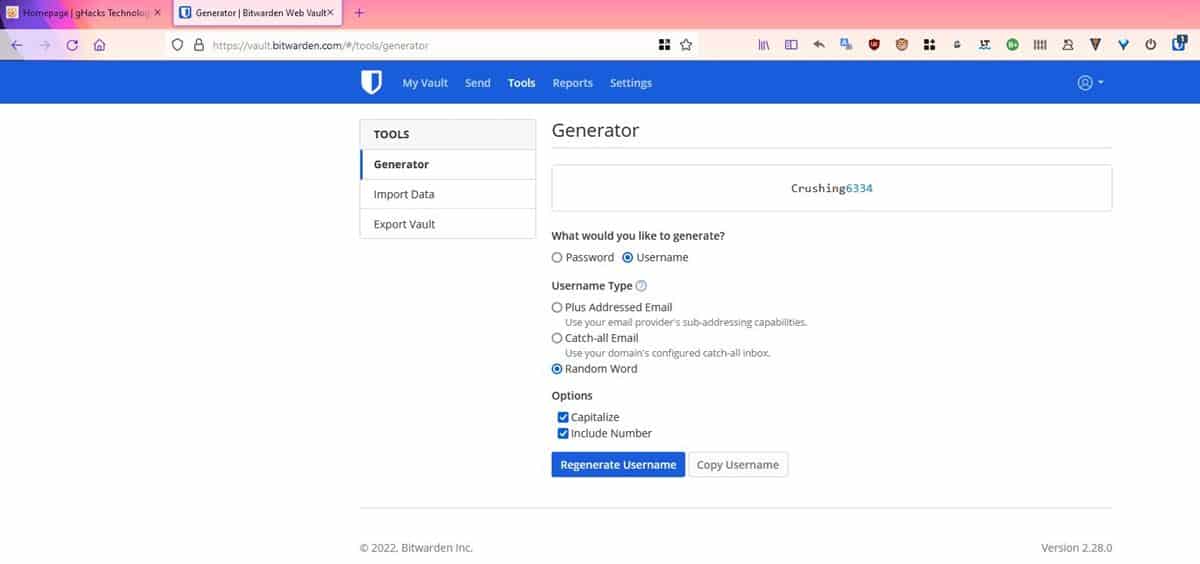
While many people use password managers for the convenience of remembering a single login, the master password, the primary advantage that such programs offer, is that they provide an easy way to create unique passwords. Bitwarden is taking it to the next level, the open source password manager now has an option to generate unique usernames.

It is intriguing to say the least, and was a highly requested feature by the community. Having unique usernames can protect your privacy, and minimize the impact of identity theft. The feature was released for the web vault a few days ago, before it was added to the browser extension, and the desktop programs.
Note: The Bitwarden extension has not been updated to 1.58.0 on Mozilla Firefox's AMO, Google's Chrome Web store, Edge Add-ons, etc, at the time of writing this article. It is expected to be available shortly. The new version of the extension, v1.58.0, also fixes an issue related to importing notes and URLs in macOS and Safari.
I tried the web version and downloaded the desktop version to try the username generator.
How to generate unique usernames in Bitwarden
1. Open Bitwarden app on your compute, and go to the add new login page.
Ctrl + N on desktop (or) File > Add New Item.
2. Click the refresh icon in the username field.
3. It opens a new window, that has three options to derive the username from.
- Plus Addressed Email
- Catch-All Email
- Random Word
The first option, Plus Addressed Email, uses your email provider's alias service. E.g. If you used example@gmail.com, it can be used to generate a sub-address like example+5jh56y8t@gmail.com. The generated password is displayed at the top of the window, you can copy it to the clipboard using the icon next to it. Don't like the created username? Hit the refresh icon to generate a new one. Click the tick icon to accept the generated username.
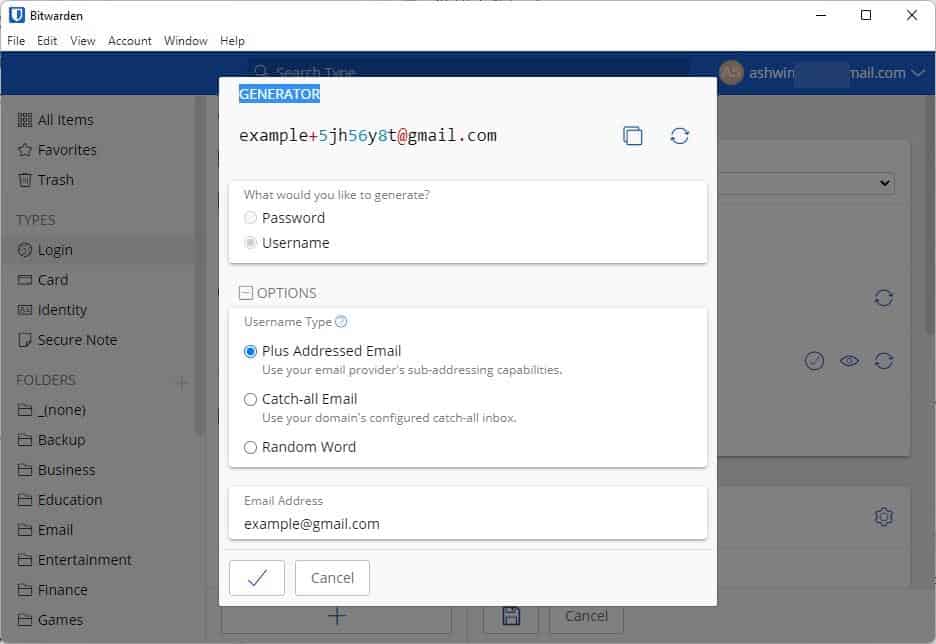
Catch-All Email uses your domain to create a unique username. The Random Word option can be set to capitalize the first letter and include numbers in the username.
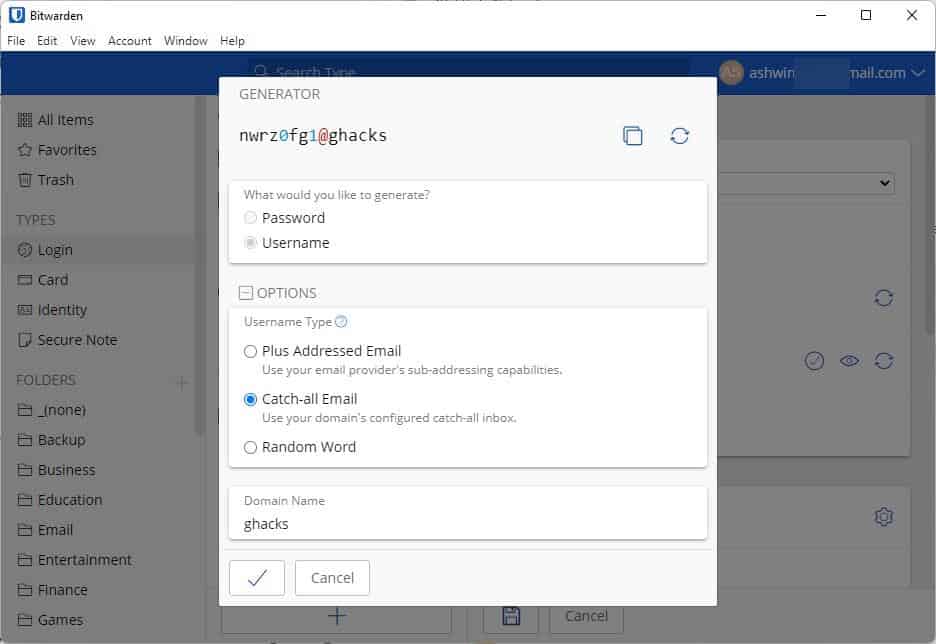
Download Bitwarden Password Manager 1.33.0 for Windows, macOS, and Linux from the official website, or the GitHub Page.
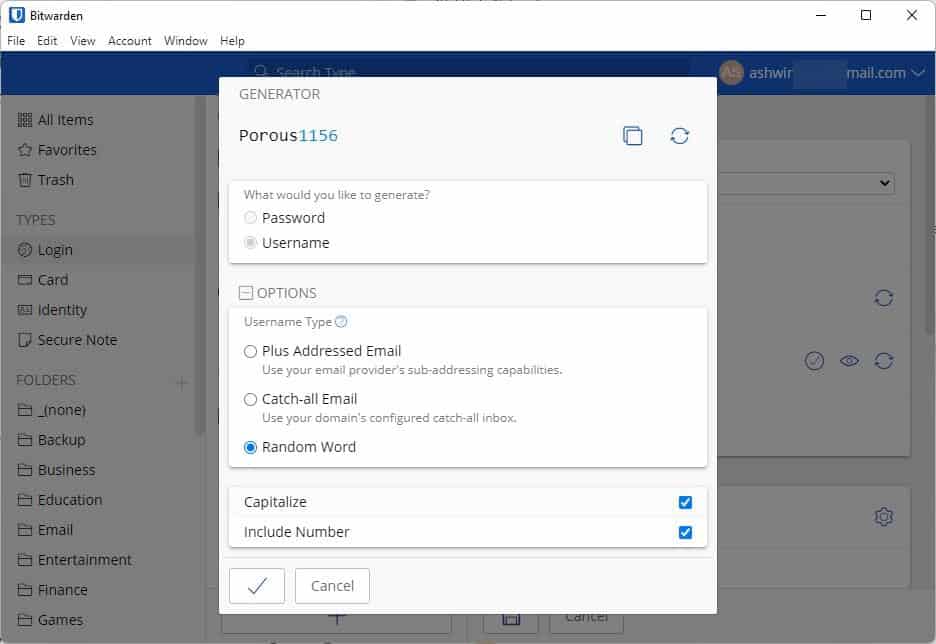
Web vault version
Oddly, the new feature is not available in the "add new login"popup in the web vault. Here's how you do it instead. Open the Tools page in the Bitwarden web vault, select the Username option (under Generator), and follow the above instructions given in step 3.
Bitwarden suffered an outage a few days ago, and since its servers were inaccessible, so were the passwords. A statement from the company said that users could access their vaults if they had already logged in, but many users were unable locked of their accounts during the downtime. I can confirm that the browser plugin logged me out as well, I only noticed this when it couldn't save the credentials that I typed on a login page.
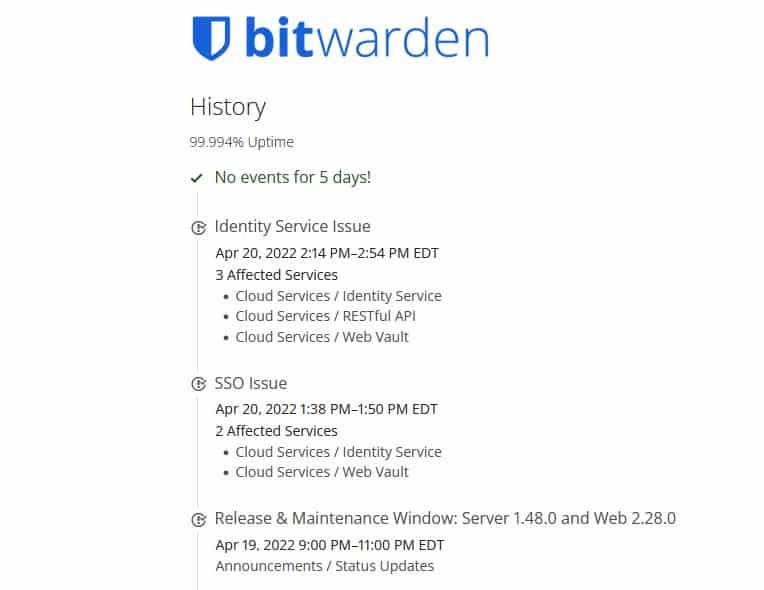
I can't verify this claim as I don't use the desktop app, but a couple of users have reported that the Bitwarden app logged them out, and uninstalled itself. When users asked the company for an explanation about the outage, Bitwarden declined to reveal the details.
Tip: Having a backup option that you can use offline may help you during such outages. You can export your Bitwarden vault to a JSON or CSV file, and import them to a local password manager like KeePass.



















Just updated Bitwarden to 1.58.0
Bitwarden for passwords (& Card, & Identity & Secure Notes) is great, but I’ll have no use of its new username generator given alias email addresses are generated/managed here with the AnonAddy service/extension and exceptionally with my email service provider when confidentiality includes the very external alias provider (even if I have confidence in the one I use).
As advised in the article, Bitwarden user data backup is imperative IMO, should an outage occur. Personally I have a copy as well on a non-connected password manager.
I haven’t experienced the Bitwarden server outage mentioned in the article, maybe because I wasn’t logged out (I only PIN-lock when exiting Firefox reserving logout for a long absence). Nevertheless I have experienced in the past situations which proved that backups appear providential; seems obvious yet I know fellow comrades who still haven’t included this practice in their computer management policy…
I tried bitwarden as dockers on my Nas. It works good. But I miss the tags und advanced attributes feature from KeePassXC.
I forgot to mention that I deeply dislike sites that display, when they do, the user’s username on their very page, when this username is that of the registered email address. Displaying a user’s username must imperatively require when registering a separate username, a so-called ‘displayed username’. No need for anyone looking over your shoulder to spot immediately the email address you’ve used for that site.
That’s be all. Please carry on :=)
Great so all unique usernames are basically Russian names.
If my house burns down with computer inside I can access Bitwarden from any family member’s computer or my phone. I hope you have a copy of KeePass in the cloud and a plan to get you cloud access username and password. No? Offline backup? What if that sits inside your place that burns down? Offline backup? What if that disk fails. I had two offline backup disks fail on the same day once.
There are different methods of maintaining passwords. Everyone thinks the one they use is better (or they would not be using it). If it works for you, stick with KeePass but make sure you have a plan if it fails.
Actually when main house burns down I have a USB stick with all main important data who I weekly update externally stored. Also I have a USB storage back (grab back) with most of main software and data in the case I have time enough, to pick everything from the sex hour fire proof wall safe.
Next to the USB backup I have a DVD backup from the important data.
I use the have a removebel block-level backup with blocks with data who I daily switched and store somewhere else.
But I learned to monitor main hard disk closely and i have become better with that and already a year before there going to crash I have a spare SSD or hard disk in storage.
On the other side, if Bitwarden servers somehow failed, what will you do?
Having 2 backups failed on the same day at once is very very unlikely(unless you are telling the truth).
Are you using your backups disks for daily use too? I have 10+ years backup disks and flashdisk that still works until now.
The trick is only use them when you want to backup something.
When there is an outage servers are inaccessible!
Here Bitwarden supplies again the proof that you never should use a password manager that is not completely (100%) installed on your computer, phone, etc., and can work without, any access from the outside.
And hacking from websites is a common thing nowadays so do you have saved your passwords really securely?
And was the last outage from Bitwarden maybe it was a hack and over a few years if ever, the user will know about it when he is lucky?
My personal favorite stays KeePass.
You can roll your own Bitwarden server which you control.